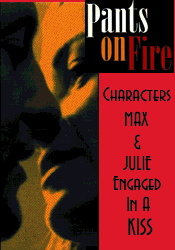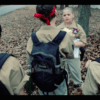
Filmmaker Rocky Collins Arrives in Maine for a Festival Screening of Pants on Fire
Written by Mary Phillips-Sandy | Posted by: Anonymous
Meet Rocky Collins, writer, filmmaker, and Mainer-in-exile. Having spent many years making documentaries, he recently began his foray into feature films with the black comedy Pants on Fire, which he wrote and directed. Pants is hot, and that’s not just a bad pun – Collins won Best Writer at the Los Angeles Independent Film Festival for the screenplay, and the film has been selected to close the upcoming Maine International Film Festival. Collins will return to Maine for a brief visit during the Festival to introduce Pants on Fire at Closing Ceremonies on July 19. He spoke with writer Mary Phillips-Sandy on the phone from his home in Los Angeles.
Mary Phillips-Sandy: Where in Maine are you from?
Rocky Collins: I grew up in Orono.
MPS: You left to go to college, right?
RC: I went to Wesleyan University in Connecticut.
MPS: Did you go to film school after that?
RC: No, but I majored in film while I was there.
MPS: And then you came back to Maine after college. Why did you do that?
RC: I came back mostly because I was writing, and looking for a free place to live while I was writing. I was really on my way out to LA, where a lot of my friends were headed, but I didn’t have a specific goal out there. While I was writing, living in Orono at my folks’ place, I saw an article about this company called Varied Directions in Camden. It said they were making documentaries, so I gave them a call and they said, "Why don’t you come down?" I had been editing; the last job I’d done before going back to Maine was editing, in the Washington, D.C. area. I brought a sample reel and they hired me on the spot. I moved to Camden the next day and was there for about ten years. And then I moved to New York.
MPS: What made you decide to move to New York?
RC: In Camden, for most of the time, I felt like I had died and gone to heaven. I did something that I didn’t think I’d ever be able to do – work in film and live in Maine. But all I was doing was documentaries. They were great projects, but I had given up what I really intended to do: fiction. I did documentaries for The American Experience, a PBS series on American history, and I realized that I was pushing them more and more, maybe experimenting too much for anybody’s taste. PBS isn’t the place for experimentation. I needed to set up shop someplace else, so I decided to go to New York. My wife and I moved down in ’91 and started a little company [Elevator Pictures] out of our apartment, which outgrew the apartment. We did three features, two more American Experience documentaries, some other stuff for Lifetime, and Turner, and some commercials.
 MPS: And now you’re in LA.
MPS: And now you’re in LA.
RC: Way too much of my energy was going into running a film company. So I sold it to my partner, who was the producer of Pants on Fire, so I could move to LA and really concentrate on writing. I’m now back doing what I set out to do.
MPS: Is it true that you inevitably wind up in LA if you want to work in film?
RC: I think it’s a waste of time not to come and spend a little bit of time here. It’s the harsh reality of it. I don’t know that anybody has to live here forever, but it’s where the money is. It isn’t in New York, and it’s a lot more in New York than it is in Maine. It’s just the ugly truth. Film’s a business, you know. You have to find people with money to pay for it. It’s the only art form where the artist can’t afford his or her own tools, and you can’t get around that. You’ve got to get the money, and the money’s in LA. Not just the money, but the people who make it their business to find projects, and put projects together, and the actors, and everybody.
MPS: What do you miss most about Maine?
RC: Family. Peace and quiet. I miss Orono, but even more than Orono I miss Pembroke, which is where my family spent the summers. My dad is a college professor, he’d have summers off, so we would spend virtually the whole summer in Pembroke at a little cottage on Cobscook Bay. Way up above the tourist zone, no electricity, no running water. I spent two months a year there, every year, and I really, really miss that. I think Maine completely spoiled me for relaxation. Unless I get someplace where there are absolutely no other people, I don’t feel like I’ve really relaxed.
MPS: Who are some of the filmmakers who have inspired you?
RC: One great thing about Orono, growing up there, was the university had great films. When I was in high school, I used to ride my bike up to the university almost every night and see Fellini films, Bergman films, and Bunuel, the European masters of the time. Those were the films that got me interested in filmmaking to begin with. When I went away to college, I knew I wanted to write and/or study film, and I ended up studying film. The film program at Wesleyan is incredible. I’m continually stunned at how many people I meet here, in the film business, who came out of Wesleyan. The films that inspired me the most I learned about there. And those filmmakers tend to be the people who worked in Hollywood in the ‘40s and ‘50s as mavericks within the Hollywood system… people who had the ability to work within the system and within the genres, but could really make their film their own. People like Sam Fuller, Nicholas Ray, Douglas Zerk… The real genius of Hollywood in its heyday was the way in which the writers and directors would find ways to put a lot of subtext into a film. It seems like Hollywood films now have no subtext. If you spend $100 million on a film you have to make sure everybody on the planet understands every single concept.
MPS: Any new projects in the works?
RC: Dozens. There’s a detective story set in Maine, which I’ve been describing as Fargo meets The Big Sleep.
MPS: Cool!
RC: Yes. It’s called Snowball in Hell. It’s just in the script phase, but I’ve got a couple of producers already interested. And there’s a remake of Wuthering Heights, updated, called Brooklyn Heights, with a black Heathcliff.
MPS: Would you direct these yourself?
RC: I would definitely direct Snowball in Hell. It’s been a lifelong dream to get back to Maine and make a film in Maine, about Maine, my way. I don’t think I’ve ever seen it done even remotely right.
MPS: No. They always have fake accents.
RC: They just don’t work.
MPS: Okay, final question. My brother wants to know what your favorite flavor of ice cream is.
RC: Spam ripple.
MPS: Really? Wow. I guess that’s what LA does to you.
RC: No, I’m just joking. I really like peanut butter ice cream.
For more information, visit the Pants on Fire web site at http://fullsite.com/elevator/











